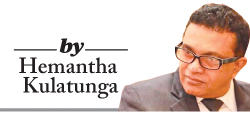 Social media platforms have become an integral part of our daily lives, connecting people globally and facilitating the exchange of information. However, while the positive aspects of social media are widely acknowledged, the unregulated dissemination of content on these platforms has given rise to numerous negative impacts.
Social media platforms have become an integral part of our daily lives, connecting people globally and facilitating the exchange of information. However, while the positive aspects of social media are widely acknowledged, the unregulated dissemination of content on these platforms has given rise to numerous negative impacts.
In Sri Lanka, individuals and groups with dubious intentions appear to be grossly infringing upon the fundamental rights of others under the pretext of “freedom of speech” on various social media platforms, including Facebook, YouTube and several messaging applications.
Amid the agreement of the majority and stiff obstruction of the opposition parties, the much-publicised “Online Safety Bill” was passed in Parliament last week. The purpose of the Bill is to provide safety from the damage caused by the communication of prohibited statements, prohibit the usage of inauthentic online accounts for prohibited purposes, flag specific online platforms and websites for the propagation of false statements and suppress the financing and other support of the communication of prohibited statements.
The public perception is that there are two factions in the opposing groups. The first is the political opposition, which customarily contests every move of the Government for publicity, aiming at their vote bases. These politicians are under the impression that openly criticising the contents of the Bill can make way for votes for their parties in upcoming elections.
Dubious and questionable activists
The second faction is the social media activists, including dubious and questionable You Tubers, who are anxious to spread misinformation, slander others for financial gains and campaigners of political parties who are merciless when it comes to propaganda.
Apart from the above groups, members of the civil society this writer spoke to are in principle agreeable with the proposals in the Bill, although most of them were uncertain about the proposed five-member “Online Safety Commission,” which has extensive powers. Particularly, they were dissatisfied that the members of the commission are appointed by the President, although it is subject to the approval of the Constitutional Council (CC).
They opine that the commission members may be political appointees, although, as per the Bill, the members must have qualifications and experience in one of the fields of information, technology, law, governance, social services, journalism, science, technology, or management.
The recent Sri Lankan experience of unregulated social media is not only dangerous but also extremely destructive in many ways. Due to a lack of supervision, monitoring and adequate preventive laws, activists with evil intentions have intentionally damaged peace and harmony on many occasions. For example, online abuse against children in Sri Lanka, such as sexual exploitation, cyberbullying, extortion and violent radicalisation, is alarmingly on the rise. The current situation is so serious that joint research conducted by Save the Children Fund, the State Ministry of Women and Children, and several other prestigious organisations has concluded that three out of every ten children who participated revealed that they have experienced some sort of online violence.
Frequently discussed, cyberbullying and online harassment have become intolerable menaces in Sri Lanka. The lack of stringent regulations on social media contributes to the prevalence of cyberbullying and online harassment. Individuals, particularly vulnerable groups, become targets of malicious attacks, causing significant psychological distress and, in extreme cases, leading to tragic consequences such as self-harm.
Unregulated social media allows the rapid dissemination of misinformation and fake news, leading to public confusion and mistrust. False narratives can easily gain traction, impacting public opinion and even influencing critical decisions such as elections. During the past few years, society has seen numerous damaging and derogatory contents directed at innocent victims appear constantly.
Another grave area created by the abuse of social media is the spread of extremist content, particularly religious ideologies. During the past few months, this has become a hot topic in society, and if the authorities had not contained it swiftly, the repercussions would have been disastrous.
Extremist groups leverage unregulated social media to disseminate radical ideologies with the intention of recruiting new members. The absence of strict oversight allows the unchecked propagation of extremist content, posing a threat to religious harmony in the country. The common belief is that most often these attempts are money-centred and that various doubtful elements are behind them.
The ease of creating nefarious substances on social media is currently a concern. Misinformation can be generated and distributed by anyone who possesses a digital device. Therefore, reliability in terms of accuracy is often uncertain. Malicious content can be directed at innocent people, instigating social discontent. Limitless freedom on social media platforms directs dubious persons to generate negative information to harm others.
Public opinion
In the past few years, social media has turned out to be a huge player in influencing public opinion in Sri Lanka. A survey by the Asia Pacific Institute of Digital Marketing revealed that 90 percent of Sri Lankan internet users access news and information through Facebook. Ironically, these percentages are higher than those for largely reliable traditional news sources such as television, radio, or newspapers, according to the survey.
On average, there are approximately 8.4 million active social media users in the country, which accounts for a staggering 60 percent of the adult population. Therefore, the influence of bad substances and misinformation can have an enormous negative impact.
Inadequate legal and regulatory frameworks in Sri Lanka have been a setback to initiating legal action against cybercriminals who abuse social media. Although there are several agencies, such as the Computer Emergency Response Team (CERT), the Cybercrime Surveillance Unit of the National Child Protection Authority and the Police Cyber Crime Division, the enforcement of whatever laws confronts challenges due to multiple reasons.
Inadequate legal authority, the unavailability of skilled manpower, a lack of sophisticated tools and financial limitations are some of the constraints. Most often, the victims hesitate to seek legal assistance due to a lack of trust in the prevailing systems. Those who sought assistance opined that the process was extremely complex and time-consuming.
Perhaps, the stringent actions stipulated in the Online Safety Bill are likely to reduce cybercrimes in the country. However, the irony is that none of the critics of the Bill openly discuss the sufferings of victims. Regrettably, most opinions expressed on social media are currently based on petty political biases and not about the grave repercussions of online abuse or the bystanders who are victimised. Opposing politicians conveniently evade speaking about victims of social media abuse.
If a victim who is subjected to online harassment of any type will vouch for the intensity of mental agony they go through when malicious substances are published on social media, implementation of regulations in the new Bill can enforce fact-checking and penalise the deliberate spread of malicious content or misinformation, which can help curb the adverse effects on the public. This will protect innocent victims from the alarmingly high level of social media abuse.
Similarly, issues such as cyberbullying, the spread of injurious extremist content, increasing mental health issues due to cyberbullying and online child abuse can be substantially reduced by implementing the judicial processes proposed in the Bill. In addition, the customary political mudslinging can be mitigated significantly by implementing new laws.
As the country navigates the complex landscape of social media, it is imperative to recognise the negative impacts of unregulated offensive content on these platforms. The implementation of well-crafted regulations is essential to tone down the spread of misinformation, protect user privacy and foster a healthy online environment. Striking a balance between freedom of expression and responsible regulation is key to harnessing the positive potential of social media while safeguarding against its darker consequences.









